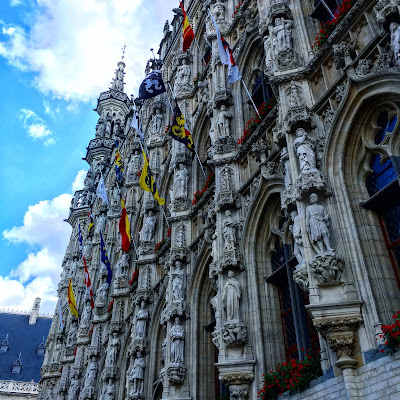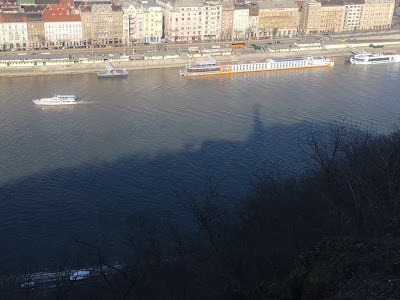 |
| The beige waiting room was like something out of a modern fairy tale. |
It's the morning of
our wedding and I'm picking wild flowers in a field an island in the Baltic
Sea. The flowers are for Kata's floral hair arrangement and my lapel. In less
than an hour, we will walk to Aersokobing's town hall and stand before the
registrar to be married.
It wasn't an easy
journey to this field on Aero island. We took a plane to Amsterdam, another
plane to Bilund (of Lego Land fame), then a bus to Vejle, a train to Odense, a local train to
Svendborg, and finally a ferry to Aeroskobing.
But
the journey began months earlier when we walked into Düsseldorf's city marriage office and saw the couples lined up out
of the waiting room, into the hallway, down a flight of
stairs and into the lobby. As if that wasn't enough, a newly married couple and
their wedding guests were navigating through this snarl of waiting
not-so-nearly weds.
We'd later learn
that couple, if they were both foreigners like us, would have spent hours
talking to bureaucrats in their embassies and the German government, gathering important documents from their homeland, getting them translated and certified, and
then waited a year for the honour of pushing their way through a crowded
government building to be allowed to the privilege of being married.
We wanted none of
that.
One
alternative was Denmark, the Las Vegas of Europe, because of the ease of
getting married. Especially for a couple of foreigners living in Germany who had
neither the time, patience, nor inclination to gather their required papers and wait
months for an appointment to
find out more papers would be needed before they could get on an eternal waiting list.
There's a baby on the way, after all.
We found one of
several businesses whose sole purpose is applying for a marriage on your
behalf in either Copenhagen or Aero Island. In a matter of weeks, we had an
appointment to get married.
We weren't the only
couple running to Denmark for a quick and easy town hall wedding. After our
comically long journey to Aeroskobing, we saw couples everywhere. Some were
mixed race couples – an obvious sign of two people from different countries
dodging huge document requirements and embassy visits, like us. We'd see others
strolling the old town, the women with noticeable baby bumps, also like us.
There was also a young-ish, extremely grumpy couple staying at our hotel, who
we'd see later at the town hall just after their wedding, still looking miserable, unlike us.
So, ours was not a
unique decision. The staff at the town hall knew the drill. When we arrived to
confirm our marriage and get a time for the next day, the elderly lady behind
the desk made copies of everything and gave us our appointment quickly and efficiently.
A rarity for city government.
 |
| The old town of Aeroskobing. |
So, the next
morning, after picking our flowers, I return to our little cottage in the
compound we share with mostly Danish retirees. It starts to rain as we finish
getting ready – a few attempts with my tie for me and Kata fixing her hair – and return to the town hall, a little wet, but punctual.
We wait in the
little grey, government-issue waiting area and watch one young couple come out,
with their parents and a few others, and watch another young couple pace
impatiently around the town hall office. Kata gets up to the bathroom, maybe
because she's nervous and maybe because she's pregnant, and while she's away
they call our name. I wait at the door of the office for Kata to finish up and
she rounds the corner directly down the hall from the office.
So, I whistle "Here comes the bride..." and Kata walks down the aisle... well the hallway.
There are three
elderly ladies in the room. One is the registrar, who will marry us, and the
other two are our witnesses, who will, you guessed it, witness the ceremony and snap photos with Kata's phone. The whole thing will last fifteen minutes.
After a bit of small talk, the registrar reads a prepared statement, asks us
do we, which we do. We put on the rings and we're married. There's a kiss,
papers to sign, and a quick toast. Then we're outside in the rain, which we've
been told is good luck in Denmark –
these marriage office people know their stuff.
When the rain clears
up, we spend the afternoon with Kata's nice camera and a tripod, DIY-style,
snapping photos around the island's famous beach houses. We eat a steak dinner
at a local restaurant. We spend the next two days exploring the island. We mentioned
our plan to the registrar, who was surprised because people don't spend any
more time here than is necessary to get married. They get in and get out. That
is a shame.
 |
| Aero island is beautiful! |
The old town is
lovely, with its 200-year-old houses and post offices and stores and
restaurants, but a walk away reveals so much more. The Danish islanders grow
lovely gardens filled with neat rows of blooming flowers and apple trees. The
entire island is covered with long, golden grass that swishes around in a sea
breeze that rarely stops.
The place is clean,
and not the German-style of clean where it gets dirty and workers clean up the
mess at dawn, but clean in a way that it doesn't get dirty because people take care
of it. We saw very little litter. Most people rode their bikes. And they smiled
and waved as we took our wedding photos on the beach, totally at ease with marriage tourists wandering their shores.
Like any island, the
pace is relaxed. We found ourselves
getting into that groove. Our only tasks was breakfast and then one errand
(registering at the town hall one day, getting married the next, mailing
documents another day). The rest of the day was spent visiting the beaches,
another town at one end of the island, eating freshly smoked salmon, or cooking
in our cottage and watching TV where the English isn't dubbed, but subtitled so
we can enjoy it without straining.
Yes,
it would have been fine to get in, get married, and get out, but lingering here
turned it into a mini-honeymoon with a wedding in the middle of it. We missed our family and friends. We wished our loved ones could
have been here for it. But in the end, it was just the two of us, and that's all we needed to make it perfect.
 |
| Newly weds. |

























